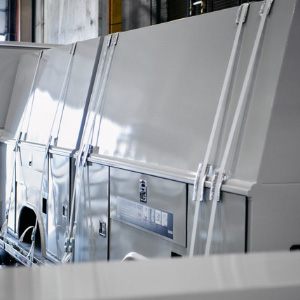As the trucking industry undergoes advancements in proficiency, safety, sustainability and performance, you want your company to be at the forefront of every change. One of the best ways you can place yourself above competitors is to switch your fleet to renewable diesel fuel. If you’re looking to support your bottom line and increase operation efficiencies, renewable solutions can benefit you in more ways than one.
Reading Body will help you learn about renewable diesel’s specifications and how it can support your expectations.
What Is Renewable Diesel Fuel?
Renewable diesel fuel is a substitute for standard diesel that’s been refined from renewable and low-carbon source materials. Often called advanced biofuel, the synthetic diesel fuel is 100% sustainable. It’s the greenest diesel on the market as well as odorless and colorless. It also delivers incredible benefits to fleet owners and truck operators.
The hydrocarbon fuel is created by hydroprocessing vegetable oils, fats and waste cooking oil, along with other biomass feedstock like garbage, wood and agricultural waste. Renewable fluid must meet the same American Society for Testing and Materials (ASTM) standards as petroleum-based diesel.
Two processes generate renewable diesel — Fischer-Tropsch and hydrogenation. Both methods take a single molecule and break it down into baser parts. Engineers then introduce hydrogen to create a clean, synthetic and high-performing hydrocarbon molecule. Chemists combine low-grade rendering with vegetable oil to form pure fuel that’s similar to ultra-low sulfur, petroleum-derived diesel.
Benefits of Renewable Diesel
The superiority of renewable diesel solutions goes beyond performance abilities by also ranking as a sustainable source of energy. Several main advantages of renewable diesel include:
- Clean burning of purer fuel
- Compatible with all diesel engines
- Doesn’t contain oxygen
- Enhanced vehicle performance
- Fewer emissions
- Fewer regenerations in diesel particle filters
- Improved mileage
- Long-term storability
- Lower carbon dioxide footprint
- More power
- No odor
- Reduced maintenance
- Superior performance in cold weather
The high-quality fluid delivers over 50% reduction of greenhouse gases compared to petroleum-based diesel. It can also deliver up to 80% lower lifecycle emissions, unlike its precursor. Renewable diesel emissions provide advanced solutions that support the environment and your fleet’s efficiencies.
Renewable diesel is a direct replacement of all diesel and biodiesel fuels in the transportation industry, which means no compatibility modifications are necessary. The fluid doesn’t contain oxygen, helping fleet owners eliminate storage, cold weather and water attraction challenges.
With no oxygen in its chemical structure, renewable diesel delivers superior performance in cold weather. It also has a higher cetane number — between 75 and 95, compared to biofuel’s cetane number resting between 50 and 60 — so the sustainable solution performs faster startups in the cold, boosts throttle response and decreases noise.
The makeup of the renewable diesel allows the fuel to combust with maximum efficiency while decreasing regenerations in the particulate filters and injector maintenance frequency.
As an advanced biofuel, it’s also odorless because it doesn’t contain impurities or aromatics. Without the two components, the solution is less harmful to drivers and the environment. You or your operators won’t have to breathe in toxic chemicals or worry about smells sticking to your clothing.
Storage benefits mean you can store the renewable diesel for extended periods with little to no deterioration in the water accumulation or quality. If water builds up, it can cause microbial growth and clog your truck’s fuel filters.
The pros of investing in renewable sources like diesel fuel give you a competitive advantage within your industry, whether you’re in the construction, HVAC, distribution or food sectors.
Renewable Diesel vs. Diesel Fuel
To understand more of what renewable diesel entails, compare it to traditional diesel. Regarding the cost and future market, what trends can you expect?
Comparisons
Petroleum diesel is made from crude oil such as organic compounds, hydrocarbons and metal. Manufacturers remove crude oil from the earth, pump it into a refinery and place it through a hydrogenation process that’s heat and pressure-based.

In contrast, biodiesel doesn’t rely on fossil fuels. Instead, it’s made from renewable sources like vegetable oils and animal fats that are processed by transesterification, where oxygen is introduced into the fuel. However, oxygen can cause several issues with the solution. You cannot use it as a stand-alone product, so it’s often blended with petroleum diesel at a 5 to 20% ratio.
Renewable diesel is also not a fossil fuel because it’s generated from renewable sources like vegetable oils, natural fats and grease. Producers remove any impurities from the raw materials. Renewable is similar to biodiesel in how it’s derived, but they are processed differently.
The sustainable fuel is made similarly to that of standard diesel, giving it the same chemical structure. Because it doesn’t contain oxygen, it won’t experience the faults of biodiesel, such as algae growth, high emissions, separation in storage and issues during freezing temperatures. It also doesn’t require blending different fuels.
Cost
With a clear understanding of what separates renewable diesel from standard and biodiesel, you can see why it costs more. However, the long-term advantages of the premium fuel outweigh the extra price.
Availability
Unfortunately, renewable fuel is not extensively available across the nation. There is a stronger focus in the western states like California, Washington and Oregon. The industry is working to meet the demand for cleaner diesel across the U.S., but currently, there is a limited supply for high demand. Many states also don’t incentivize businesses to implement renewable diesel like the western regions.
Each year, the U.S. emits nearly 7 billion metric tons of greenhouse gases, with 29% coming from the transportation market. Emissions have decreased slightly over the past few years, but the government continues to impose regulations to tighten emission standards and improve heavy-duty truck fuel economy.
Companies around the world are investing in renewable diesel advancements, and the ecological solution of renewable diesel is expected to surpass the demand for standard diesel. Many companies and states are working to make it more cost-effective as well.
Increase Job Efficiency With Reading Body
If you’re looking to make the switch from standard to renewable diesel, your operations can obtain a variety of benefits while supporting your sustainability efforts. At Reading Body, we provide service bodies for utility trucks to help surpass your current efficiency levels. We offer custom work to give you an advantage among your competitors. From compartment lighting and remote locking to ladder racks and other truck upfitting solutions, we are one of the leading truck equipment manufacturers in the U.S.
Contact us online to learn more about our products and services. We provide cost-effective solutions from locations and distributors across the states while delivering local services.



